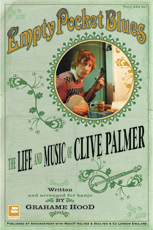

|
Empty Pocket Blues - The Life and Music
of Clive Palmer
By Grahame Hood
224 pages
Clive Palmer, a beatnik banjo player who began playing skiffle, jazz
and folk in 1950s London, honed his skills by busking in Paris and
then moved to Scotland (influencing the young Billy Connolly, among
many others) to co-found the legendary Incredible String Band.
Leaving them after their first album in 1966 to hitchhike to
Afghanistan, he had many adventures and the occasional brush with
the law. In the early Seventies he was part of the thriving Cornish
folk scene, where he arguably produced his best work, including two
albums with Clive’s Original Band (C.O.B.) which have influenced a
whole new generation of musicians. Clive is still playing and
releasing albums to this day, a bona-fide musical treasure. The book
contains much new information on the early days of the Incredible
String Band and Clive’s years in Cornwall.
-
‘The Willie Dixon of British folk
music’- Devendra Banhart
-
‘Very enjoyable. I like the tales of
Clive’s trip to Afghanistan and India.’ - Joe Boyd.
-
‘Clive is
unquestionably the best banjo player I ever heard. He was, and
still is, my banjo hero.’ - Billy Connolly
-
‘The re-incarnation of Edwardian banjo.’ - Robin Williamson
Making Time
Review
This is a
fascinating book for anyone who is less aware of what Clive did
between the first String Band album and the band reforming in 2000.
What is unusual is that Clive never seems to seek the limelight. He
loves making music and being a commercial success is not something
he seeks, indeed it may more more of a hindrance in his desire to
enjoy making music and push the boundaries of sound. Although he
hails from London, Clive has travelled extensively including busking
with Wizz Jones in Paris. He made his name
as a musician as part of the Edinburgh and Glasgow folk scenes where
he met with Robin Williamson and the likes of Billy Connolly and
Bert Jansch. Clive's Incredible Folk Club in Saucihull Street
developed out of this. The Incredible String Band was formed when
Mike Heron joined in.
By the time the first Joe Boyd-produced album was released the band
had broken up to go travelling in their separate directions. Mike
and Robin got back together as the ISB but, despite the band's
success, Clive did his own thing, mostly playing folk music around
Cornwall. He formed a number of bands including the Stockroom Five,
a four-piece band obviously. He had developed an excellent
reputation for his banjo playing and he would bring in different
musical styles but old-time music hall appears to have been one of
his favourites. His next "success" was Clive's Original Band (COB)
which released some excellent albums including Spirit of Love.
However, just as the band was being recognised Clive left to try new
things.
Clive was not a full-time musician, i.e. unemployed, all the time.
He had worked in factories including learning how to make musical
instruments. He started to make instruments for others and seems to
have specialised in pipes, local versions of bagpipes. These
included Cornish pipes and Northumbrian pipes. He has been playing
the latter on stage in recent years. These and the guitar have shown
that he is more than just a banjo player.
Roll on the 1990s and there is a mini String Band revival, largely
thanks to the launch of Andy Roberts' beGlad fanzine. Suddenly
people were asking about Clive again. A gig in London brought Clive
back from his Cornish home to a small but appreciative audience. A
couple of years later and he was touring with Robin again. At the
end of this tour Mike joined and the three ISB members were playing
together again. Yes it was absolutely freezing in the Edinburgh
venue which made it almost impossible to concentrate on the music
and enjoy the evening. Still, the reunion of the String Band came
out of this. Many thought it wrong to interfere with the memories
but, for others, it was a chance to hear the songs performed by
those who wrote them and as the ISB. A highlight of the reformed ISB,
with and without Robin Williamson, was Clive's rendition of Mike
Heron's Air. The circle was not unbroken but rejoined.
Grahame has written an excellent account of Clive's career. Most
reading this will know about the Incredible String Band and the
reformed Incredible String Band. However, much of the book discusses
the year in-between, a period which will be less well-known to most
and, consequently, more interesting. This was a lower profile time
so the depth of information included shows what a superb piece of
research this was. Recommended reading for String Band fans and
more. |

